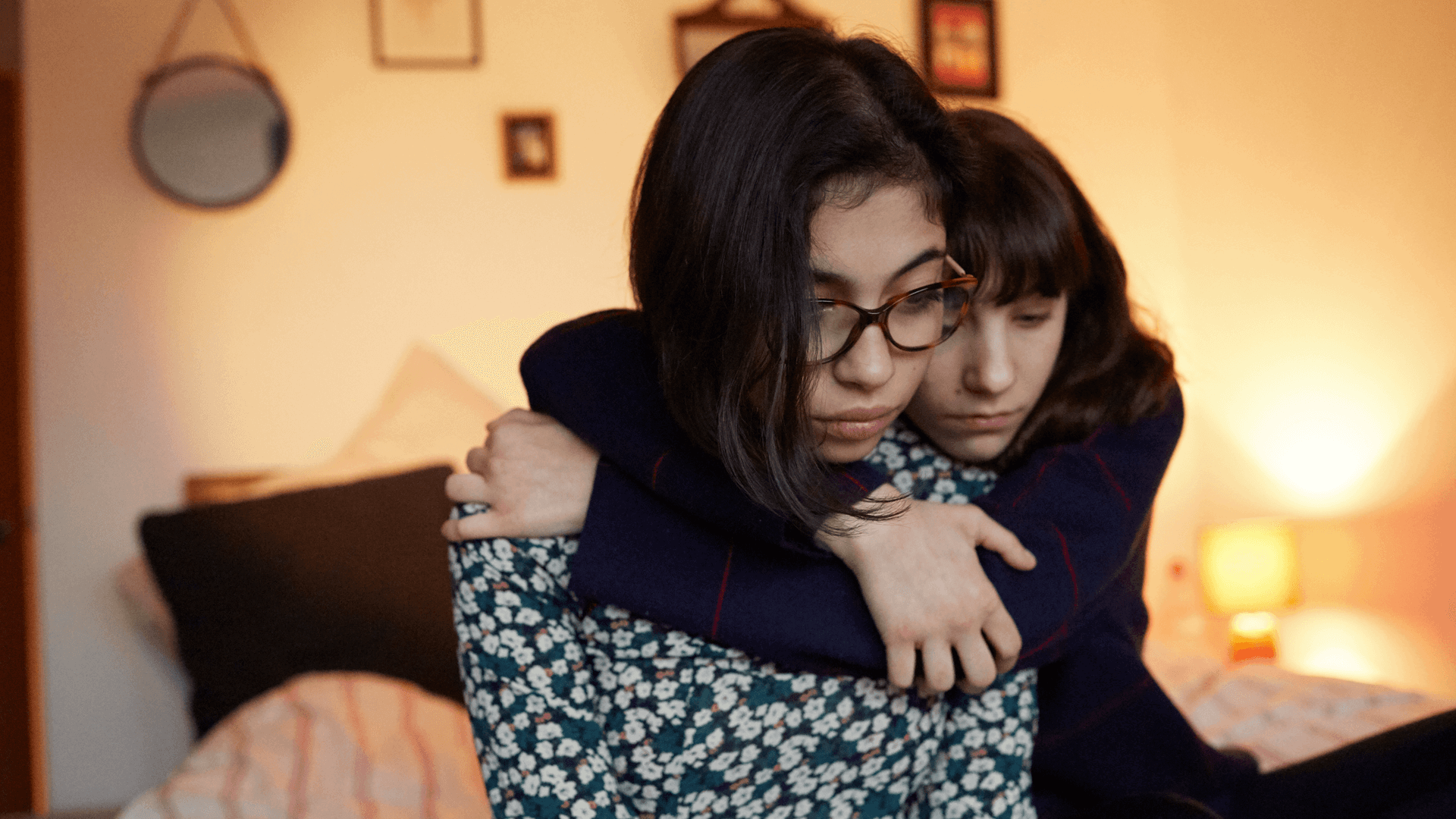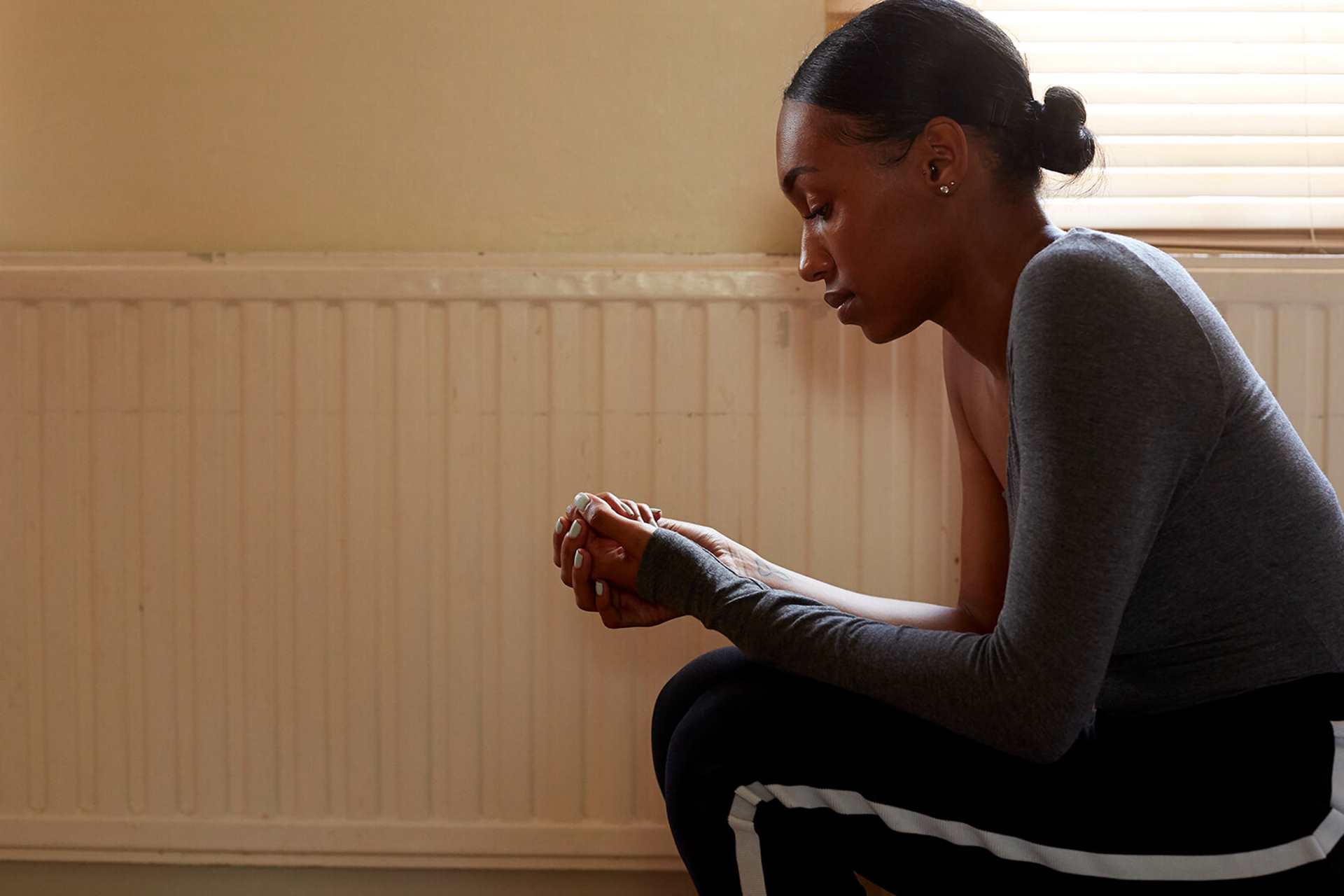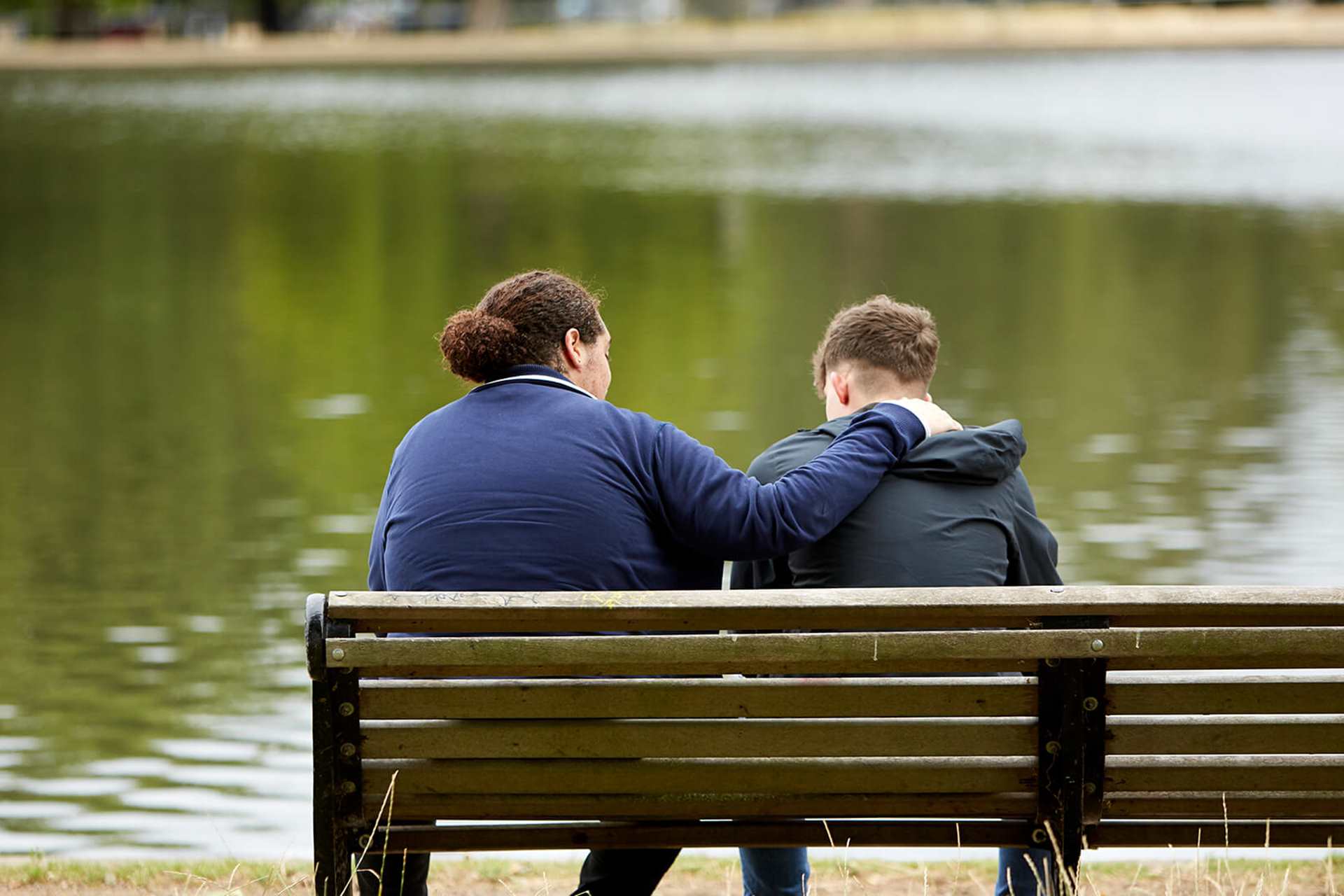What is grief?
Grief is how you react to losing someone or something in your life, it’s not just about death. Experiencing a loss can be incredibly tough, no matter who or what it is, or your relationship to them. But it’s not a mental health condition. It’s something that most people will experience at some point in life.
Grieving is a personal thing. You might feel a mix of emotions, or you might feel numb. There’s no right or wrong way to do it. Whatever you’re feeling is okay.
Everyone’s journey with grief is different. That means you might feel the loss differently to the people around you. Your culture, beliefs and community can all shape how you cope. Sometimes you might feel a pressure to grieve a certain way, but know that whatever feels right to you is valid.
Taking care of yourself and grieving your own way is important. But also try to be mindful of how others are grieving, as their process might look different to yours. They might not be ready to talk about it, even if you are. Neither of you is doing anything wrong; you’re just on different journeys.
Grief can hit you at any time. You might think it’ll happen at a certain moment, like your first holiday without the person you’ve lost. But it can also catch you off guard. Sometimes you might not feel anything for a while, and then it hits you much later – you might hear this called ‘delayed grief’.
How grieving might make you feel
-
Grief can bring up a bunch of emotions. Some people find it overwhelming. Others experience it as a physical pain. Some people find that they just feel numb. There’s no right way to feel when you experience a loss. Your reaction is valid, whatever it looks like. And if you don’t feel much at all, that’s fine too. It doesn’t mean you’re made of stone, or that you didn’t care about the person you lost. It’s also common for your feelings to change with time. Try to feel your feelings without judging yourself. Grief is hard, so try to go easy on yourself.
-
Feelings of guilt and anger
When someone you care about dies or isn’t in your life anymore, it’s normal to feel guilty or like it’s somehow your fault. But it’s important to remember that you are not to blame at all. Your emotions might shift and change, and that’s normal. But feeling less pain or sadness over time doesn’t mean you’ve stopped caring about the person you’ve lost. Finding happiness in the things you enjoy doesn’t mean you’ve forgotten them or stopped loving them. Feeling anger is a normal response to loss as well. Especially if you didn’t get to say goodbye or had no control over how things were left. It’s okay to feel angry, but it’s important to understand that what you feel is valid.
Working through your grief
Grieving takes time and being with the people you love can help you through it. You might suddenly feel sad when you’re not expecting it or feel on edge about your health or other people’s. This is just your body and mind are reacting to the loss, and that’s okay.
You might never stop grieving, but opening up to your family and friends and figuring out what support you need can help you get on top of it.
Losing someone close to you can really shake up your life. If you’re struggling to accept their death, finding it hard to handle everyday things or feeling stuck, reach out to someone you trust. Talk to a friend, a sibling, a teacher or someone you trust about how you’re feeling. We all need help from time to time.
Stages of grief
Some studies suggest there are five steps to the grief cycle that people go through - the 'five stages of grief'. But everyone grieves differently. You might experience all or some of these feelings, and you could experience them in any order. Or you might not experience them at all.
Some people argue that the five stages of grief theory can make people feel like they’re grieving the 'wrong' way. Remember that however you grieve is okay. This is just one way to understand your feelings that you may find helpful.
When it’s hard to accept what’s happened and you’re feeling confused and can’t understand it.
You might feel really angry, blame yourself or others for what happened or feel like things are out of control.
Feeling sad and lost after the loss, like everything just feels heavy.
You might feel guilty, thinking you could have done more or wishing things had turned out differently.
Starting to accept what happened, understand it, and feeling ready to take steps forward.
Tips for expressing your grief
Sometimes, finding ways to express your grief can be helpful. Here are a few different ideas you could try if you’re struggling to cope with what’s happened:
Turning my pain into something creative helped me channel the anger and pain I was feeling.
Coping with grief and loss on big occasions
Big celebrations, like birthdays or religious holidays can be tough when you’ve lost someone important. Being around people you care about can sometimes help, but these moments can also bring the grief to the surface.
During those times, it’s important to take care of yourself. If things start to feel too much, try to step away and give yourself some space. It’s normal to miss the person you’ve lost and feel triggered by what’s going on. And remember, the people around you might also be grieving. Try to share what you need and understand their needs – it can help everyone to cope better.
Having a plan for if you start to feel overwhelmed can be helpful. You could tell someone you trust about how you’re feeling so they can check in with you. Knowing where you might be able to have some quiet time to regroup can help you to stay grounded as well.
If you’re grieving a death, these events can be times when you remember the person you’ve lost. Here are some ideas for how you can celebrate their memory:
-
Family traditions
Carry on with activities or traditions you used to do together, like playing a game or visiting a special place. You could also create new traditions or fulfil something they always wanted to do.
-
Remembering together
Visiting a special place, reading a poem or lighting a candle can help to focus in on the memory of the person who’s no longer with you.
-
Visit their resting place
Go to where they are laid to rest with something personal, a handwritten note or some flowers.
-
Write a message
Create decorations or a mural with messages from friends and family about the person you’ve lost.
-
Share memories
Make time to talk about the person you’ve lost and share your favourite memories.
-
Remember their favourite things
Spend time doing the things they enjoyed. This could be eating their favourite food or listening to a song they liked.
Collective grief and trauma
Grief isn’t always something we go through alone. Sometimes a whole group of people can feel sadness and loss after someone dies. This is called collective grief. It might happen if someone in your school or community dies, if a life is lost to violence or crime, or after a major event like a natural disaster or terrorist attack. In these moments, grief can affect anyone in the community, including teachers, neighbours, classmates – even people who didn’t know the person very well.
When a whole community experiences loss, it’s important to remember that everyone grieves in different ways. Some might cry, others go quiet, and some might act like nothing’s happened at all. All of these reactions are totally valid.
Collective trauma is when a group of people go through a shared, traumatic event. The trauma can be both personal and social, and everyone will react and cope in their own way.
Collective trauma can cause feelings of shock, fear, or distress. It can affect how you feel, think and connect with each other - sometimes for a long time. Sometimes, it can have long-term effects that are passed down through generations, like after a war or period of oppression. It can lead to feelings of anxiety, depression, or PTSD, and can completely change how a community sees itself and the world around it.
How to look after your mental health when experiencing collective loss
-
Talk to someone you trust
This could be a friend, teacher, faith leader or trusted adult. You might also want to speak to someone from your community who really understands what you’re going through – talking to someone who gets it can help you feel seen and supported.
-
Take breaks when you need to
If you’re finding it hard to focus on study, work or hobbies, take a minute to step away or get some fresh air. You can always try again later.
-
Write down how you feel or get creative
Sometimes, getting your emotions out on paper can help you make sense of them. It doesn’t have to be neat or perfect – just getting it out can bring some relief. If writing’s not your thing, try expressing your grief in other creative ways like drawing or music. Being creative can help you clear your mind and channel your energy into something positive.
-
Be patient with yourself
Focus on getting through each day as it comes and try not to look too far ahead.
-
Reach out for help
There are lots of professional organisations and helplines out there that can give you the support you need.
One of the hardest places to grieve can be at school, college or uni. Losing someone of a similar age to you can feel unfair and hard to make sense of. It can also make you scared, worried or anxious about your own life.
Seeing your friend’s empty seat, walking past the places you used to spend time together, or hearing their name might hit you in unexpected ways. You might find it hard to concentrate, feel emotionally drained, or worry about breaking down in front of others.
This is extremely tough. But there are things you can try that might help:
- Talk to someone you trust at your school, college or uni. A teacher or counsellor can help you get the support you need. And if you feel like they aren’t providing enough help, you could reach out to a community group or mentor who understands what you’re going through.
- Take breaks from studying or socialising when you need to. If you’re finding it hard to focus or engage, ask if you can step away for a minute to yourself.
- Lean on your friends. You’re likely not the only one struggling. Talking to others who knew your friend can help you feel less alone.
If someone you know dies because of violence – or you witness or hear about a fatal crime – it can really shake you. You might feel scared, shocked, numb, angry or confused. And if it’s not the first time something like this has happened in your community, those feelings can hit even harder.
Sometimes when this happens, it can feel like your community is being judged instead of supported – or like no one is listening to what you need. And police investigations and media attention can add even more pressure, making it hard to grieve in peace.
All of these feelings are valid. But you don’t have to deal with them on your own. Here are some things that might help:
- Talk to someone you trust. That might be a youth worker, mentor, teacher or community leader who understands what you’re going through. You could also reach out to an organisation that supports people affected by violence, like SaferLondon (London only) or Victim Support (England and Wales only).
- Protect your space. If media attention is making you feel unsafe or overwhelmed, you can speak to an adult you trust, contact the police, or report press behaviour to the Independent Press Standards Organisation (IPSO).
- Take action if it feels right. Some people find power in joining a support group, helping others, or speaking out through youth-led campaigns. Take a look at Power The Fight for ways to get involved if and when you feel ready.
Losing someone suddenly to a terrorist attack or natural disaster – like an explosion, tsunami or earthquake – can be deeply shocking and hard to process. These events often happen without warning, and can directly affect lots of people at once. This kind of loss can ripple through a whole community and leave a lasting impact.
If you were there when it happened, you’ll be dealing with your own trauma or injuries as well as the grief. And whether you were there or not, you might experience something called ‘survivor’s guilt’ – feeling like it’s unfair that you survived when others didn’t. This is a completely valid reaction, but it’s important to remember that you’re not to blame.
Everyone reacts differently to this kind of loss. There’s no right or wrong way to grieve. But here are a few things that might help:
- Talk to someone you trust, like a parent, teacher, youth worker or counsellor. You don’t have to make sense of everything on your own.
- Take breaks from the news and social media if it’s feeling too overwhelming. You’re allowed to switch off and protect your space.
Find your own way to remember the people who died. You might attend a memorial, light a candle, or create something in their memory. Cruse Bereavement Support has a lovely list of ways to remember someone that might inspire you.
Getting help with grief

It’s normal to feel down and a bit hopeless when you lose someone. But if you find that these feelings don’t go away, that you get physical symptoms, or you start thinking about hurting yourself, then it might be time to get help. A good first step is to see your GP. They can discuss things like counselling and medication.
It can be hard to reach out to your GP and talk about your mental health. But we have tips to help.
This is me trying
This is me trying is a short film about mental health, grief, addiction and the Muslim community.
It follows Asma, a young Muslim woman from Bradford, whose mental health struggles are dismissed as having "low imaan" (faith). Like many others, she turns to substances to cope after the death of her friend.
The film was made to help start honest conversations about how grief, addiction and mental health are often misunderstood or ignored in some communities – and to show that things can change.
How to help a friend who's going through a loss
Knowing what to say to someone who’s grieving can be tough. But just being there for them can mean a lot. Here are some other things you can do to support them.
Regularly check in with them, especially if there is a funeral. That can be a really lonely time for them. You could send them a message or ask them to hang out – whatever feels right.
You don’t have all the answers. Just being there to listen to what they’re going through can be a real comfort.
If it feels right, sharing your favourite memories of the person who passed away can be comforting. It keeps their memory alive and lets them know they’re not alone in missing that person.
It can be hard, especially if your relationship changes while they’re grieving. They might need different things from different people or stop messaging for a bit. Understanding and respecting what they need is really important.
Marie Curie has more tips and advice on how you can look after someone who's grieving.
Get help now
If you're not sure where to turn for support right now, these organisations can help.
-
Winston's Wish
Offers practical support and guidance to bereaved children, their families and professionals.
Online chat service also available on their website.
- Opening times:
- 8am-8pm, Monday - Friday
-
Hope Again
Cruse Bereavement Care’s website for young people experiencing grief.
Has lots of personal stories from young people who have lost someone, as well as information and advice.
- Opening times:
- 9:30am - 5pm, Monday - Friday
-
Survivors of Bereavement by Suicide (SOBS)
Offers support for people over the age of 18 who have lost someone to suicide.
- Opening times:
- 9am - 9pm, Monday - Friday
-
Let's Talk About Loss
Let's Talk About Loss supports 18-35 year olds who have been bereaved of anyone, at any time.
They run monthly, peer-led meet ups all over the country and there is one online too, so wherever you are, you can access support. They talk about grief in a relaxed, fun and safe space with others of the same age who 'get it'. -
Grief Encounter
Supports children and young people through bereavement.
Free webchat service available.
- Opening times:
- 9am - 9pm, Monday - Friday
-
Marie Curie
Offers care, guidance and support for people living with any terminal illness and their families.
If English isn't you or your family's first language, they can provide an interpreter for over 200 different languages.
Free online chat service also available.
- Opening times:
- 8am - 6pm, Monday - Friday; 11am - 5pm, Saturdays; 10am - 4pm, Bank Holidays
-
Samaritans
Whatever you're going through, you can contact the Samaritans for support. N.B. This is a listening service and does not offer advice or intervention.
- Opening times:
- 24/7
-
Childline
If you’re under 19 you can confidentially call, chat online or email about any problem big or small.
Sign up for a free Childline locker (real name or email address not needed) to use their free 1-2-1 counsellor chat and email support service.
Can provide a BSL interpreter if you are deaf or hearing-impaired.
Hosts online message boards where you can share your experiences, have fun and get support from other young people in similar situations.
- Opening times:
- 24/7
Whether you love the page or think something is missing, we appreciate your feedback. It all helps us to support more young people with their mental health.
Please be aware that this form isn’t a mental health support service. If you are in crisis right now and want to talk to someone urgently, find out who to contact on our urgent help page.
At YoungMinds we take your privacy seriously. If you’d like to read more about how we keep the information we collect safe, take a look at our privacy policy.







